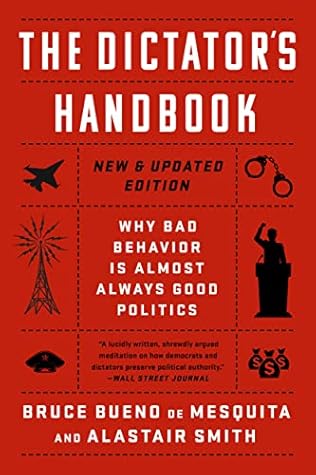More on this book
Community
Kindle Notes & Highlights
Read between
December 7 - December 12, 2020
Fundamentally, the nominal selectorate is the pool of potential support for a leader; the real selectorate includes those whose support is truly influential; and the winning coalition extends only to those essential supporters without whom the leader would be finished. A simple way to think of these groups is: interchangeables, influentials, and essentials.
Rule 5: Don’t take money out of your supporter’s pockets to make the people’s lives better.
Hungry people are not likely to have the energy to overthrow you, so don’t worry about them. Disappointed coalition members, in contrast, can defect, leaving you in deep trouble.
the general rule of thumb for rebellion is that revolutions occur when those who preserve the current system are sufficiently dissatisfied with their rewards that they are willing to look for someone new to take care of them. On the other hand, revolts are defeated through suppression of the people—always an unpleasant task—so coalition members need to receive enough benefits from their leader that they are willing to do horribly distasteful things to ensure that the existing system is maintained. If they do not get enough goodies under the current system, then they will not stop the people
...more
it does not matter what happens to the people provided that he makes sure to pay the army.
There is never a point in showing your hand before you have to; that is just a way to ensure giving the game away.
it is better to have loyal incompetents than competent rivals.
Rigged elections are a warning to powerful politicians that they are expendable if they deviate from the leader’s desired path.
There’s no election better than a rigged one, so long as you’re the one rigging it.
Ruling is about staying in power, not about good governance.
In autocracies, it is unwise to be rich unless it is the government that made you rich. And if this is the case, it is important to be loyal beyond all else.
In a phenomenon often called the resource curse, nations with readily extractable natural resources systematically underperform nations without such resources.15 Resource-rich nations have worse economic growth, are more prone to civil wars, and become more autocratic than their resource-poor counterparts.
financial crises are one of the important reasons leaders are compelled to democratize.
When the leadership relies on few essentials, higher education is for the children of the powerful; when the bloc of essentials is big, it is for the betterment of everyone.
“Power tends to corrupt, absolute power corrupts absolutely,”
It is fine for leaders to enrich the people’s lives, but it has to come out of the leader’s pocket, not the coalition’s.
Many revolutions end up simply replacing one autocracy with another. On some occasions the successor regime can actually be worse than its predecessor.
That is why successful autocrats make rebellion truly unattractive. They step in quickly to punish harshly those who first take to the streets. This is what we saw in Iran following the June 2009 presidential election. The regime quickly stepped in, beating, arresting, and killing protesters, until the people feared continuing to take to the streets.
freedoms also make protest easy. But since people like these freedoms, granting them can also dissipate their desire to bring down the government. Protests are common in democracies but revolts intending to overthrow the institutions of government are not.
In democracy, protest is about alerting leaders to the fact that the people are unhappy,
Autocrats dislike freedoms because they make it easy for people to learn of their shared misery and to collaborate with each other to rise up against the government.
Nations awash with natural resource wealth or lavished with foreign aid rarely democratize. They are the world’s most oppressive places. Their leaders have resources to reward their essential supporters without having to empower the people.
A massive natural disaster, an unanticipated succession crisis, or a global economic downturn that drives the autocrat’s local economy to the brink or beyond the brink of bankruptcy can also provide a rallying cry for protesters.
Elections are nice, but winning is nicer. Still, sometimes the people seize the moment of an election to shock the incumbent, voting so overwhelmingly for someone else that it is hard to cover up the true outcome.


